Bahareh Sarrafzadeh
Evaluating Style-Personalized Text Generation: Challenges and Directions
Aug 08, 2025Abstract:While prior research has built tools and benchmarks towards style personalized text generation, there has been limited exploration of evaluation in low-resource author style personalized text generation space. Through this work, we question the effectiveness of the widely adopted evaluation metrics like BLEU and ROUGE, and explore other evaluation paradigms such as style embeddings and LLM-as-judge to holistically evaluate the style personalized text generation task. We evaluate these metrics and their ensembles using our style discrimination benchmark, that spans eight writing tasks, and evaluates across three settings, domain discrimination, authorship attribution, and LLM personalized vs non-personalized discrimination. We provide conclusive evidence to adopt ensemble of diverse evaluation metrics to effectively evaluate style personalized text generation.
Prototypical Human-AI Collaboration Behaviors from LLM-Assisted Writing in the Wild
May 21, 2025Abstract:As large language models (LLMs) are used in complex writing workflows, users engage in multi-turn interactions to steer generations to better fit their needs. Rather than passively accepting output, users actively refine, explore, and co-construct text. We conduct a large-scale analysis of this collaborative behavior for users engaged in writing tasks in the wild with two popular AI assistants, Bing Copilot and WildChat. Our analysis goes beyond simple task classification or satisfaction estimation common in prior work and instead characterizes how users interact with LLMs through the course of a session. We identify prototypical behaviors in how users interact with LLMs in prompts following their original request. We refer to these as Prototypical Human-AI Collaboration Behaviors (PATHs) and find that a small group of PATHs explain a majority of the variation seen in user-LLM interaction. These PATHs span users revising intents, exploring texts, posing questions, adjusting style or injecting new content. Next, we find statistically significant correlations between specific writing intents and PATHs, revealing how users' intents shape their collaboration behaviors. We conclude by discussing the implications of our findings on LLM alignment.
Conversational User-AI Intervention: A Study on Prompt Rewriting for Improved LLM Response Generation
Mar 21, 2025Abstract:Human-LLM conversations are increasingly becoming more pervasive in peoples' professional and personal lives, yet many users still struggle to elicit helpful responses from LLM Chatbots. One of the reasons for this issue is users' lack of understanding in crafting effective prompts that accurately convey their information needs. Meanwhile, the existence of real-world conversational datasets on the one hand, and the text understanding faculties of LLMs on the other, present a unique opportunity to study this problem, and its potential solutions at scale. Thus, in this paper we present the first LLM-centric study of real human-AI chatbot conversations, focused on investigating aspects in which user queries fall short of expressing information needs, and the potential of using LLMs to rewrite suboptimal user prompts. Our findings demonstrate that rephrasing ineffective prompts can elicit better responses from a conversational system, while preserving the user's original intent. Notably, the performance of rewrites improves in longer conversations, where contextual inferences about user needs can be made more accurately. Additionally, we observe that LLMs often need to -- and inherently do -- make \emph{plausible} assumptions about a user's intentions and goals when interpreting prompts. Our findings largely hold true across conversational domains, user intents, and LLMs of varying sizes and families, indicating the promise of using prompt rewriting as a solution for better human-AI interactions.
Learning to Represent Human Motives for Goal-directed Web Browsing
Aug 07, 2021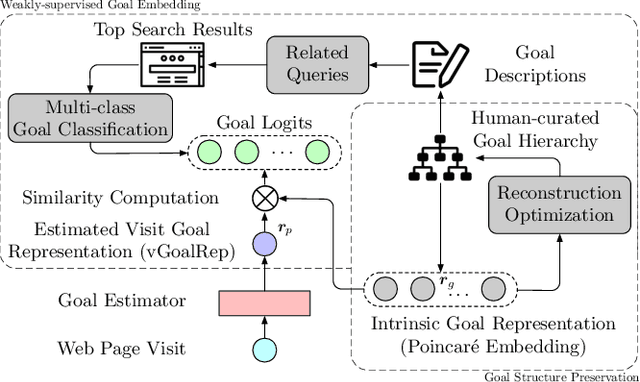



Abstract:Motives or goals are recognized in psychology literature as the most fundamental drive that explains and predicts why people do what they do, including when they browse the web. Although providing enormous value, these higher-ordered goals are often unobserved, and little is known about how to leverage such goals to assist people's browsing activities. This paper proposes to take a new approach to address this problem, which is fulfilled through a novel neural framework, Goal-directed Web Browsing (GoWeB). We adopt a psychologically-sound taxonomy of higher-ordered goals and learn to build their representations in a structure-preserving manner. Then we incorporate the resulting representations for enhancing the experiences of common activities people perform on the web. Experiments on large-scale data from Microsoft Edge web browser show that GoWeB significantly outperforms competitive baselines for in-session web page recommendation, re-visitation classification, and goal-based web page grouping. A follow-up analysis further characterizes how the variety of human motives can affect the difference observed in human behavioral patterns.
Characterizing Stage-Aware Writing Assistance in Collaborative Document Authoring
Aug 18, 2020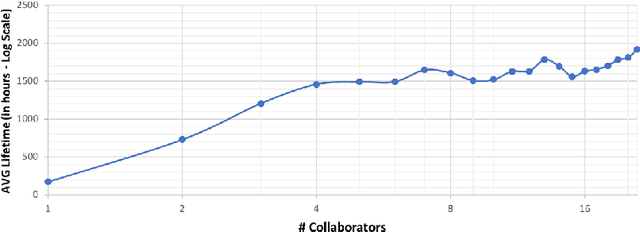
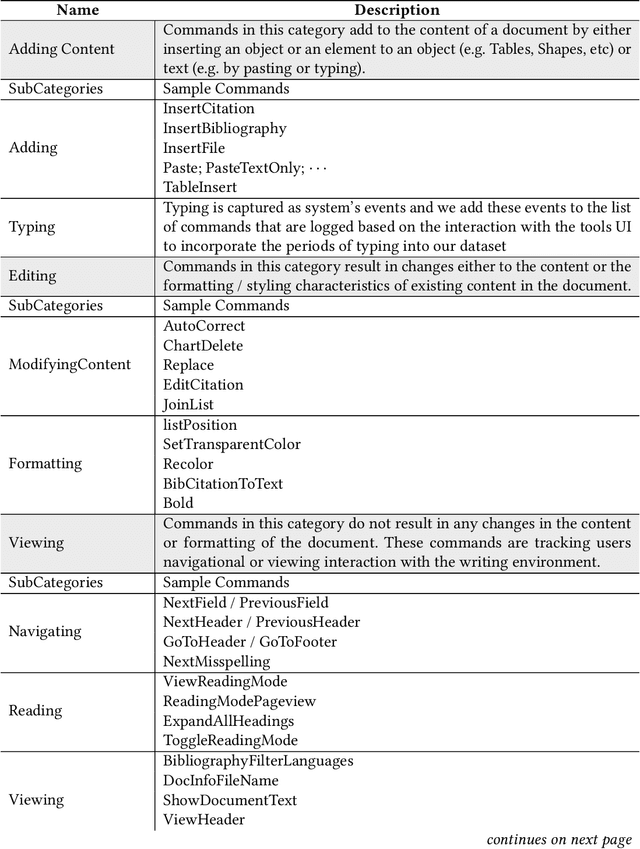
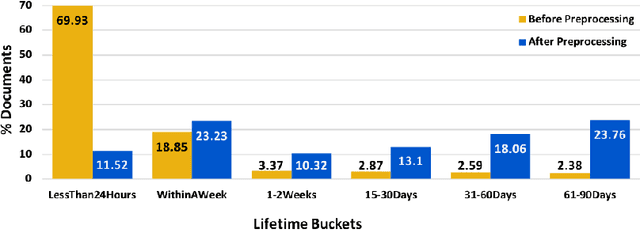
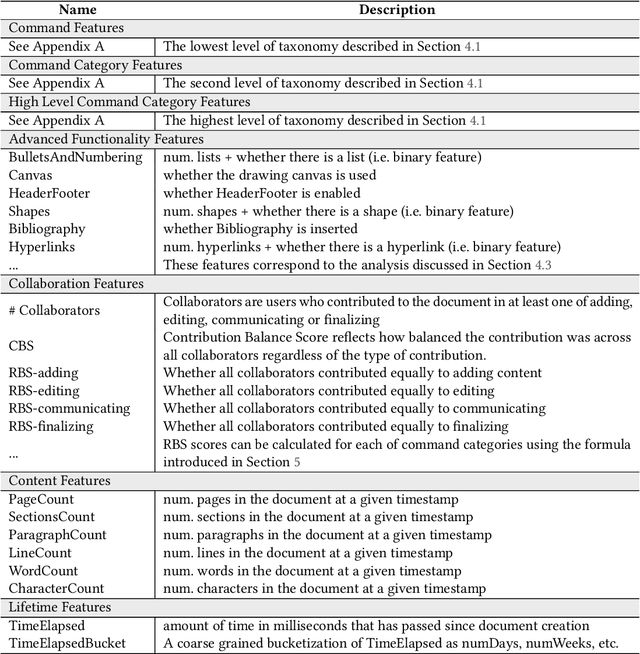
Abstract:Writing is a complex non-linear process that begins with a mental model of intent, and progresses through an outline of ideas, to words on paper (and their subsequent refinement). Despite past research in understanding writing, Web-scale consumer and enterprise collaborative digital writing environments are yet to greatly benefit from intelligent systems that understand the stages of document evolution, providing opportune assistance based on authors' situated actions and context. In this paper, we present three studies that explore temporal stages of document authoring. We first survey information workers at a large technology company about their writing habits and preferences, concluding that writers do in fact conceptually progress through several distinct phases while authoring documents. We also explore, qualitatively, how writing stages are linked to document lifespan. We supplement these qualitative findings with an analysis of the longitudinal user interaction logs of a popular digital writing platform over several million documents. Finally, as a first step towards facilitating an intelligent digital writing assistant, we conduct a preliminary investigation into the utility of user interaction log data for predicting the temporal stage of a document. Our results support the benefit of tools tailored to writing stages, identify primary tasks associated with these stages, and show that it is possible to predict stages from anonymous interaction logs. Together, these results argue for the benefit and feasibility of more tailored digital writing assistance.
* Accepted for publication at CSCW 2020
 Add to Chrome
Add to Chrome Add to Firefox
Add to Firefox Add to Edge
Add to Edge